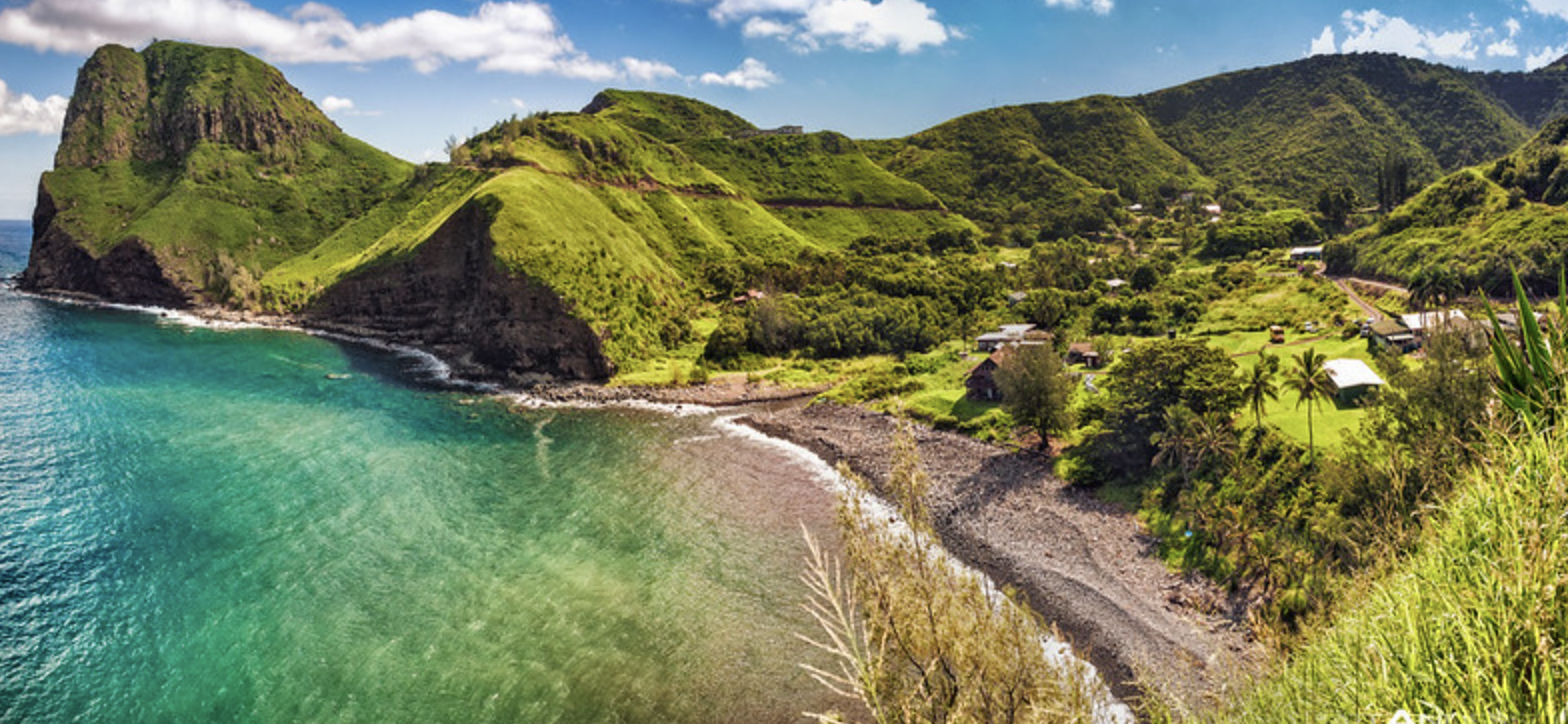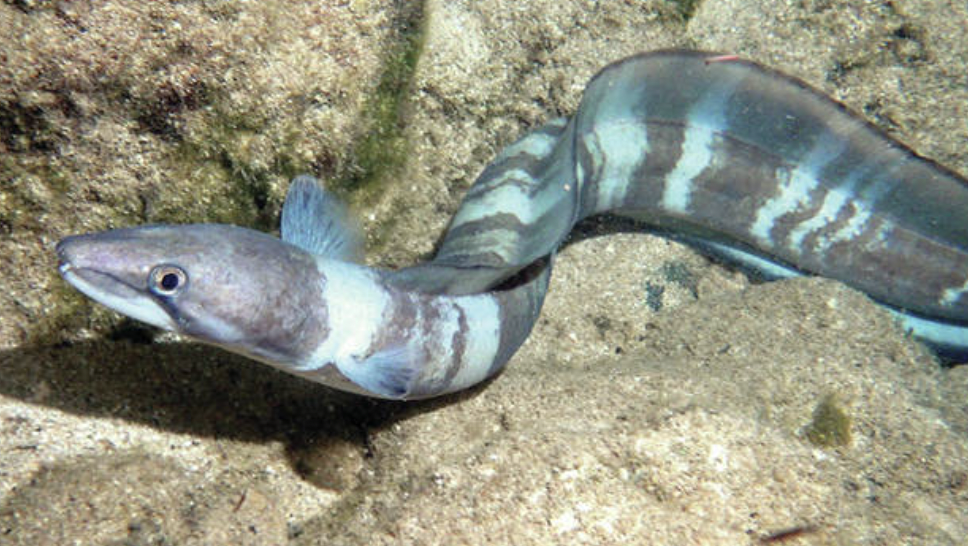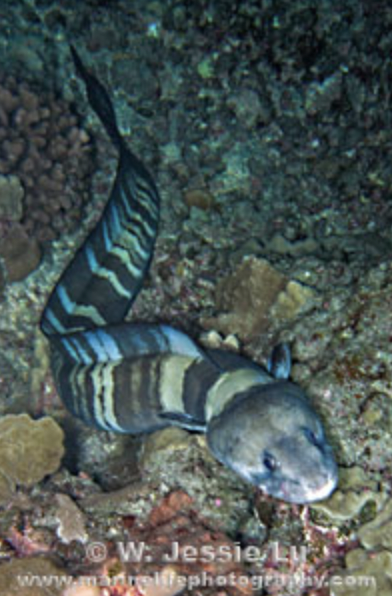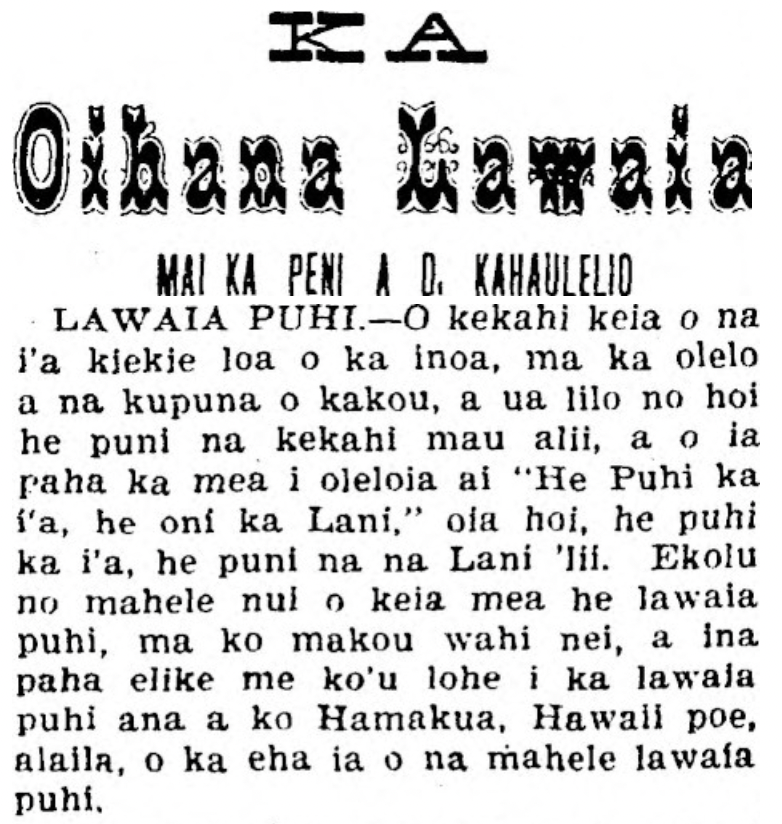Edward Kahaʻi
Ka Lawaiʻa Puhi Ūhā

Mānaleo Series
These short clips of native speakers on Ka Leo Hawaiʻi talking about their lives and practices are invaluable windows into our past, our language, and ourselves. Our mahalo kūhohonu goes out to Larry Kimura and Puakea Nogelmeier for their foresight in preserving the voices of these hulu kupuna.
Listen and read along:
1. Press "listen in browser" or the orange arrow on the sound file below (make sure your sound is up).
2. Scroll down and read along in the language of your choice.
3. Repeat as needed.
4. Remember to select "listen in browser" to stay in this site.
Edward Kahaʻi shares about his experiences catching puhi ūhā.
LK: No laila, ma kēia lawaiʻa lamalama, he aha kā ʻoukou loaʻa o ke kai?
EK: Ā.
LK: He aha ka mea maʻamau ma ka lamalama?
EK: Puhi
LK: Puhi?
EK: Puhi ūhā.
LK: ʻO ia?
EK: A ʻo kēlā wahi, ahh nui ka puhi. Ka puhi, ma ka pahi.
LK: Pahi?
EK: He pahi a…ʻoki kō.
LK: ʻAe, ʻae, ka pahi nui, eh?
EK: Yeah, ka pahi nui. Hili mākou i ka huelo o ka puhi.
LK: ʻOki ʻia ʻana kēia huelo?
EK: Yeah. A, pau.
LK: Make?
EK: Make. ʻAʻole hiki ke holo.
LK: Hahaha.
EK: A ko mākou wahi, piʻi mai ka puhi i ka…i ka pō, ʻai. Pōloli paha, piʻi mai e ʻai.
LK: Kēia ūhā?
EK: Yeah. Puhi ūhā.
LK: ʻĒ, ʻē, ʻē.
EK: Nui ka puhi!
LK: Nui nō ka puhi. ʻAʻohe nō makaʻu?
EK: Oh well, ka manawa liʻiliʻi a, makaʻu! Na ka poʻe nunui e hele e kiʻi ai i ka mea, ka puhi.
LK: ʻAi ʻia nō ka puhi?
EK: Ō! ʻAi ʻia! ʻAi ʻia. Kupa nō hoʻi, hoʻomaloʻo ʻia, pūlehu ʻia. ʻAi. ʻAi nō au i ka puhi.
LK: ʻO kēlā ʻano wale nō ka mea maʻa nō i ka ʻai ʻia.
EK: ʻO ia wale nō, ʻo ia ke ʻano o ka puhi.
LK: Ka ūhā.
EK: Ūhā.

Puhi ūhā. Pic: Terry Lilley
Unuhina (Translation):
LK: So, when you would fish by torchlight, what did you folks catch from the ocean?
EK: Well.
LK: What was your usual catch for torch fishing?
EK: Eel (puhi)
LK: Puhi?
EK: Puhi ūhā (Mustache Conger)
LK: Really?
EK: And at that place, lots of puhi. Puhi, we’d get them with a knife.
LK: A knife?
EK: A cane knife.
LK: Yes, yes. The big knife, yeah?
EK: Yeah, the big knife. We would strike the tail of the puhi.
LK: The tail would be cut off?
EK: Yeah. And that was it.
LK: Dead?
EK: Dead. It could no longer swim. At our place, the puhi would come up in the night and eat. Maybe because they were hungry, they would swim up to eat.
LK: This puhi ūhā?
EK: Yeah. Puhi ūhā.
LK: Yeah, yeah.
EK: Those puhi were big!
LK: Surely the puhi were big. You weren’t scared?
EK: Oh well, when I was little I was definitely scared! The bigger guys would go get the puhi.
LK: People would eat this kind of puhi?
EK: Oh, it was eaten! Definitely! Made into soup, dried, broiled. Yep. I ate puhi.
LK: Hahaha. Only that kind of puhi was usually eaten?
EK: Yes only that one, that type of puhi.
LK: The ūhā.
EK: Ūhā.


Puhi ūhā. Pic: Terry Lilley
Puhi ūhā. Pic: Terry Lilley

He ʻĪnaʻi
Edward Kahaʻi was a native of Kahakuloa and the many hono (bays) of west Maui, where puhi ūhā was plentiful and prepared in a variety of ways when caught.
Perhaps the puhi ūhā was the species most commonly eaten because other types of puhi were ʻaumakua for some families.
Noted Maui fisherman Daniel Kahāʻulelio, who penned the column Ka ʻOihana Lawaiʻa, shared a very funny anecdote, saying that on the Koʻolau side of Maui, the puhi ūhā was prized more than a woman:
“Ma nā pali koʻolau o Maui, he mea nui, a minamina ʻia ka puhi, ma mua o ka wahine mare, a pēlā paha i lilo ai kekahi wahine maikaʻi o ua pali koʻolau lā o mākou i kekahi keiki uʻi kanaka maikaʻi o ka uahi kololio o Kula, he hau.”
"On the windward side of Maui, the puhi is an important and treasured thing, even more than a wife, and perhaps that is why some beautiful women of our windward region were lost to some handsome men of the chilly gusts of Kula, known as the Hau."

Ka Nupepa Kuokoa, 20 June 1902
"He puhi ka iʻa, he ʻoni ka Lani."
Like Mr. Kahaʻi, Kahāʻulelio talks about catching eels by lamalama, or torchlight fishing. This is one of several methods he discusses for catching puhi. Read the original Hawaiian here.
Na Hina Kneubuhl i kākau a hoʻonohonoho i kēia moʻolelo. Mahalo nui iā Helena Bakutis i ke kōkua ʻana mai ma ka palapala leo a me ka unuhi ʻōlelo.
These pieces are all working interpretations. Should you see a kuhihewa, kiko hewa, or have any sort of manaʻo to share, please email kauamelemele@gmail.com - Mahalo!
Click here to access the full recording on Kaniʻāina.

Ka Nupepa Kuokoa, 20 June 1902
Ka Nupepa Kuokoa, 20 June 1902
